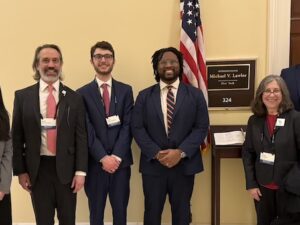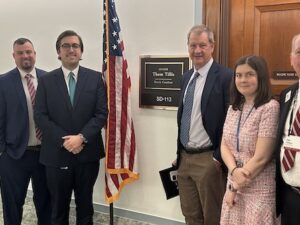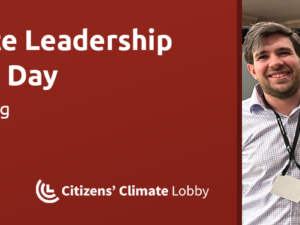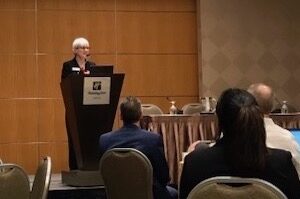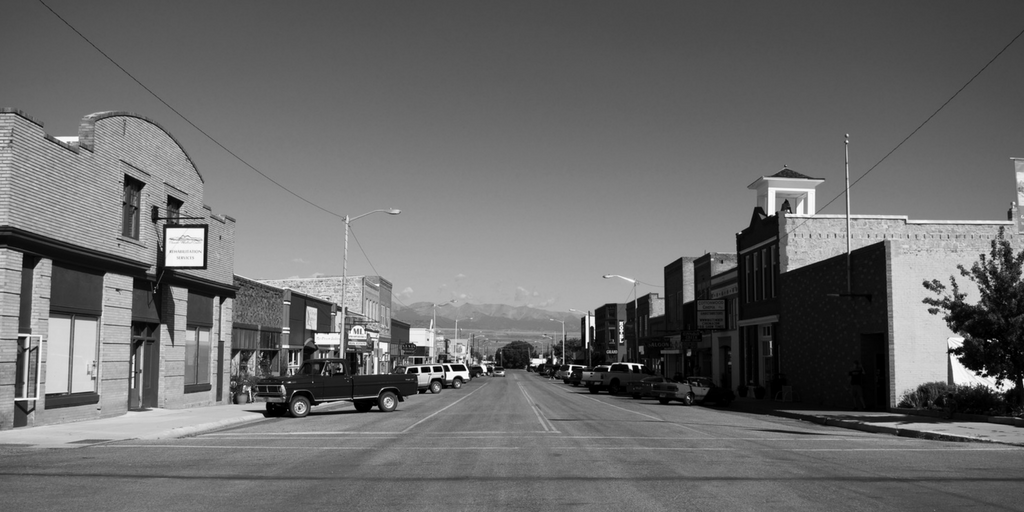
Main Street of Big Timber, Montana, where the author visited her local chamber of commerce to discuss carbon pricing. Photo courtesy of The Big Timber Pioneer.
Connecting with a small town chamber of commerce
By Alex Amonette
Last year, I moved to a small town. To make business contacts, I joined the local chamber of commerce and gave a small presentation on my skills. I’ve had two small gigs as a result. I was excited to go and make friends.
This year, I asked to have a 10-minute spot at a meeting to discuss the Carbon Fee and Dividend. I was very nervous! What if they label me an “environmentalist”? That’s a dirty word here. What if I can’t get any more gigs as a result? That’s going to make paying my bills extremely difficult!
The director put an announcement on the website that said I was going to discuss climate change. I quickly emailed her that I was going to discuss a market-based policy that aligns with the US Chamber of Commerce policy priorities and directly benefits Main Street.
Making friends in the chamber
Before I went to the meeting, I visited one of the stores on Main Street—a quilting shop, since I needed some fabric for curtains. I got to talking with the shopkeeper, a young woman about age 35. Last summer, we had a situation in town where the river that runs through the town was closed to fishing, recreation, and boating for two weeks—all because the river was too warm, fish were dying due to a parasite, and the water levels were too low. Fish and Game said climate change was to blame. I asked her if that affected her business.
“Yes!” she said. “When the husbands go fishing, the wives come in and shop. We lost a lot of business those two weeks.” Then she told me that last winter she couldn’t get her sidewalk plowed due to the height of the snow—her shop was closed then for two days.
I told her I think these extreme weather impacts are due to our changing climate. She nodded her head. I said I was going to the chamber meeting to discuss a market-based solution. She replied she was the secretary! I felt I had a friend before I went into the meeting.
A receptive audience
I spoke after a man addressed the group about health insurance. I said that we have insurance for our businesses to pay for risks, like fires, or computer repairs. I added I had just been talking with the shopkeeper about the river closure and that we need to keep our shops on Main Street open, regardless of what Mother Nature throws our way.
All 30 people listened politely as I spun through the concepts of a fee, dividend, and border tariff adjustment based on the information about Carbon Fee and Dividend on the Citizens’ Climate Lobby’s website. I said that with the dividend, we all might be able to go out and eat at the hotel where we were having our luncheon meeting. They laughed at that—the dinner prices are very steep. I handed out a brochure I had made, pitched directly to this group of people. They applauded, and I sat down. The director asked where she could find out more about it, and I pointed her to the website on the brochure.
Their warm reception even extended to the chamber’s newsletter the following week. It read, “The Chamber was very excited to have two special guests at the April monthly meeting. Alex Amonette came to talk about Carbon Fee and Dividend legislation. The Citizens’ Climate Lobby is a volunteer nonpartisan group that gives citizens a voice in market-based climate solutions. A carbon fee is based on the carbon content of the fossil fuel and assessed at the source (i.e. the mine, the well). The carbon fees collected are then distributed to all households as a monthly dividend. To learn more, visit: https://citizensclimatelobby.org/remi-report/.”
Time is short! If I can do this, so can you. Good luck!

